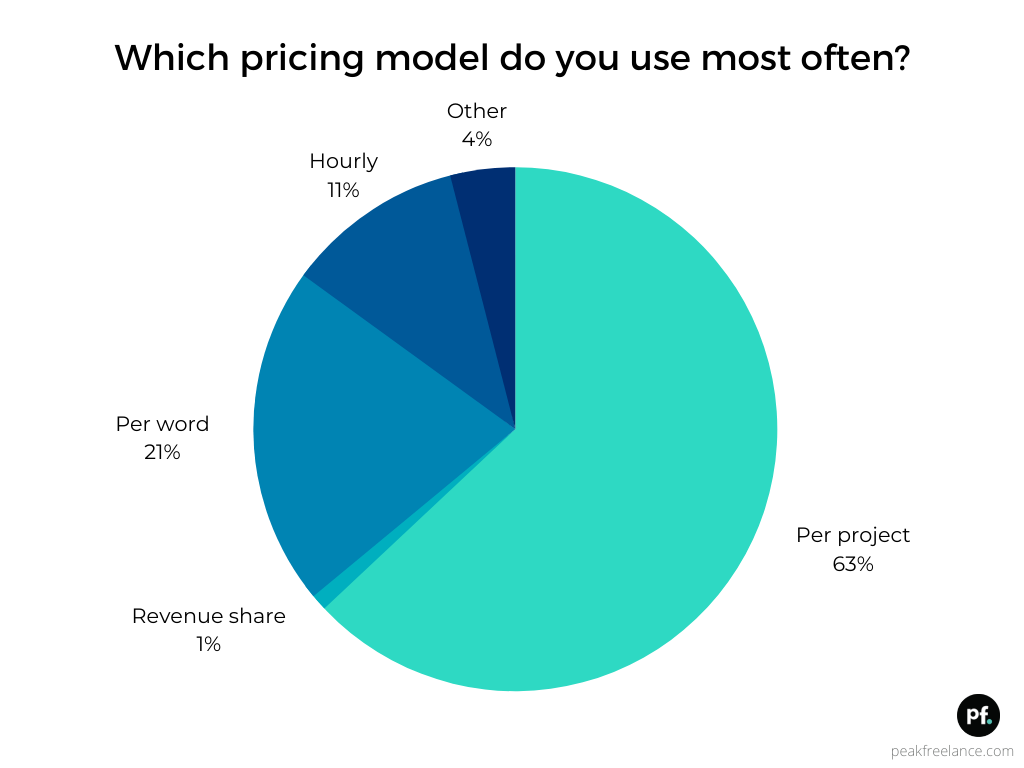Dear Freelancer,
I have a freelance opportunity, but I have no idea how to charge them. I am a brilliant writer and I can write about anything. I have five years of experience and a Master’s in Professional Writing. But I have limited experience freelancing.
Do I charge per hour? Per word? Per project?
Sincerely,
Experienced Writer, Newbie Freelancer
Dear Experienced,
I’m gonna keep this one brief. Three minutes or less, I promise.
Why?
Because there’s no such thing as universal advice in freelancing.
I know plenty of successful freelancers who charge per word, quite a few successful consultants who charge per hour, and a good handful of both who package things up to have potential clients meet them on their terms.
I’d like to keep this response to a single line: do what works for you.
But that’s not all that helpful, is it?
Instead, I’ll say this: project pricing makes the most sense in most cases.
Let’s start with the data.

Last year, we found that most freelancers in our community charge per project, and just 32% charge a per word or hourly rate for writing work. Given that over 8 out of 10 of those who charge per word have less than a year of freelancing experience, I’d say we’re off to a great start.
Here are two quotes that sum up the attraction of project pricing from the original benchmark survey:
“I started with per-word pricing but as I gained experience I realized it didn’t truly reflect the work needed to create a high-quality post. So I switched to per project rates.”
“Per project factors in research, thinking time, writing, editing and procrastination. It’s easier to quote what you’re worth. With per-hour and per-word, anything other than the actual writing of the words becomes harder to justify and/or is commonly queried by clients.”
That second one, in particular, gets at the heart of it.
When you’re a freelancer, the actual creative stuff is just a portion of the work it takes to keep your business running and growing. Yes, you need to estimate your hours and how fast you can write, but that doesn’t mean you need to charge your clients that way.
Here’s an old tweet that gets at what I mean:
I called it “napkin” math for a reason: it’s not very scientific, and it’s designed to be a starting point rather than a self-mandate set in stone.
But it should get you out of the self-doubt and race-to-the-bottom shenanigans that keep underpaid freelancers underpaid for far too long.
You also get to engage in the magic of value-based pricing. An SEO article isn’t as valuable to a client as a case study, and a case study isn’t as valuable as a landing page. If you charged per word, the dollar amount on each of those would be reversed.
Indulge me for one more tweet:
See what I mean?
By wrapping things up into the value you’re providing your clients, rather than reducing your work to the lowest common denominator, you set yourself up for higher-paid work and higher-tier clients.
Yes, there are exceptions—like hourly consulting on a more nebulous project or setting up a retainer for x amount of words when the scope is in flux. So I’ll say again: project pricing makes the most sense in most cases.
But that still leaves us with one problem: “per project” is still relatively broad. When some say “per project” they may actually mean “per deliverable”—and I think even that can be limiting in a lot of situations. You’ll still face unnecessarily short projects, wild swings in the scope of work, and constant questioning of your work’s value.
That’s why I recommend wrapping up your quotes into a monthly project rate: say, four articles and one case study per month for $3,500.
Better yet, you can wrap that up into a long-term engagement in the contract: say, $3,500 per month for 6 months with a 30-day cancellation clause. (For more on this, check out this article on freelancer money management from my co-founder.)
I promised you a three-minute read, so I’ll end here: know what you’re worth.
When I asked my audience how much they’d pay for a 1,500 word article, over half said at least $1,000. At the same time, nearly 20% said $150.
There is a massive range in freelancing rates, which is part of what makes setting rates so hard. You can head back to our freelancing rate benchmarks to get an idea of what makes sense for your level of experience.
But even if you get a “no” to your initial quote, it’s not necessarily a sign that you’re charging too much. It just means you should keep testing things to find the right clients.
Like I said, there’s no such thing as universal advice in freelancing.
I’m sorry or you’re welcome.
Sincerely,
A freelancer

